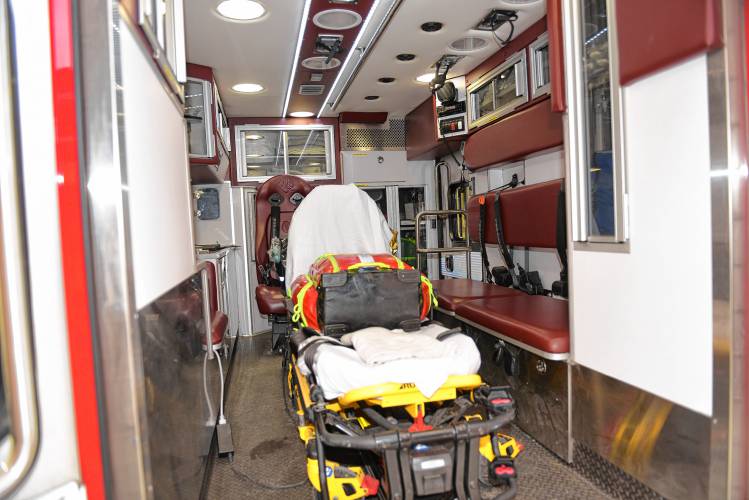Opinion: Here’s how we end ambulance balance billing once and for all

Calling 9-1-1 can sometimes be a costly decision. File
| Published: 02-08-2025 6:00 AM |
Derick Aumann is the president of the New Hampshire Ambulance Association. Nathan Borland is vice president of the New Hampshire Ambulance Association.
Let local property taxes make up the difference in funding shortfalls for ground ambulance services rather than for-profit health insurance carriers.
That is the expressed sentiment of one of the leaders of the New Hampshire House of Representatives who has chosen to protect insurance companies instead of consumers in a critical debate over the reimbursement of essential ambulance services throughout the state.
It is a persistent problem that puts families in the uncomfortable position of occasionally being billed for the balance of the cost of an emergency ambulance when — due to persistent below-cost reimbursement — that community’s ambulance service cannot afford to be in the insurance carrier’s discount provider network. It’s a challenge for families who faithfully pay their health insurance premiums every month but still face hundreds if not thousands in out-of-pocket health care costs for simply calling 9-1-1.
There is an affordable solution if lawmakers stop protecting commercial insurance providers. But how do property tax hikes factor into this situation? They’re the proposed fallback for covering costs to ambulance providers.
A House leader has proposed a bill that sets a state-wide ambulance reimbursement rate well below the amount most first responders are able to collect now. HB 316 would require insurance companies to increase premiums a few cents per month to reimburse all ambulance providers and end balance billing. The process is right, but the math is very wrong.
Under HB 316, the price tag for insurers under the proposed reimbursement schedule to ambulance providers is $4.3 million per year. This would increase average monthly commercial health insurance premiums by 36 cents, or roughly $4 dollars per member a year.
What does that resolve? Nothing. By keeping reimbursements significantly below what ambulance providers spend for equipment, training and labor, this proposal preserves a critical gap, effectively endorsing continued balance billing directly to families — something all ambulance providers want to end.
Article continues after...
Yesterday's Most Read Articles
For consumers, it would mean the potential for a bill for services after an ambulance ride remains a very real possibility. If lawmakers really want to end balance billing and stop more ambulance services from closing, they need to require that commercial insurance companies fairly reimburse all emergency ambulance providers.
How much more? Not much. Look what other states have done and are lining up to do to address this issue. HB 316 recommends reimbursing amounts that are 197% of the current Medicare-based allowed amount for ambulance services. However, the most commonly recognized rate in other states is either a community-set rate or 325% of the current rate for ambulance service according to the Centers for Medicare and Medicaid Services, whichever is lower.
That additional insurance premium for using the more commonly recognized rate is estimated to be $6.9 million per year as opposed to $4.3 million; 59 cents per month per member as opposed to 36 cents; about $7 a year in premiums per member as opposed to $4. That’s $7 more a year in insurance premiums per member to end ambulance balance billing once and for all.
Aligning statewide ambulance rates with locally set rates or 325% of local Medicare allowable rates, whichever is less, is an affordable approach that will end what has become an existential financial threat to ambulance providers, especially those in rural areas. Without this adjustment to the current reimbursement system, more ambulance providers may have to close their doors for good.
If commercial insurance reimbursement rates are not adjusted to reflect the actual cost of eliminating balance billing and more ambulance providers go out of business, the further lack of 9-1-1 coverage will add costly burdens to local communities. More towns will have to step up with additional resources and equipment to ensure timely responses to an emergency.
How will towns pay for this? Property tax hikes, which is what insurers and some legislators in Concord think is the right approach.
Fortunately, there is an alternative. HB175 would align commercial insurance ambulance reimbursement rates with what is quickly becoming the national standard — the rate set or approved, by contract or ordinance, by the county or municipality in which the ambulance service originated or 325% of the current local rate for ambulance services according to Medicare, whichever is less. Local and national industry experts agree that this will adequately cover real expenses and eliminate the need for balance billing to patients and their families.
We don’t need higher property taxes. We need to stop protecting insurance companies and fully reimburse ambulance providers for the life-saving essential work they do every day in New Hampshire.







 Opinion: Trumpism in a dying democracy
Opinion: Trumpism in a dying democracy Opinion: What Coolidge’s century-old decision can teach us today
Opinion: What Coolidge’s century-old decision can teach us today Opinion: The art of diplomacy
Opinion: The art of diplomacy Opinion: After Roe: Three years of resistance, care and community
Opinion: After Roe: Three years of resistance, care and community
